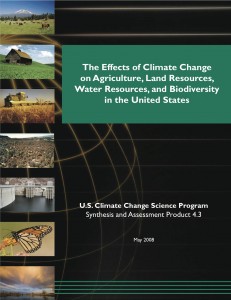The concentration of carbon dioxide in Earth’s atmosphere may double by the end of the 21st century.
In a recent Science Magazine article, scientists at University of California, Davis discovered that increased levels of carbon dioxide in the atmosphere can reduce the protein content of crop plants by as much as 20 percent. Their research shows that high CO2 levels interfere with the ability of plants to convert nitrates into proteins, thus reducing plant productivity and food quality. Increasing nitrogen fertilization might compensate for slower nitrate assimilation, but such fertilization rates might not be economically or environmentally feasible.
Food = Energy
Most crop fertilizers are produced from oil. As oil supply tightens, the price of oil will rise. The price of fertilizer will track that increase.
About 17 percent of fossil fuels are used to produce our food. The most energy intensive activities are:
- Fertilizer & pesticide production
- Irrigation
- Transportation
- Processing
Fertilizer and pesticide production accounts for 31 percent of fossil fuel usage in food production.
Business Impact
Big Ag should be concerned about this. They are the heaviest users of fertilizers and pesticides. It’s time for them to think about how to adapt to this. Organic farmers should be in much better shape. They avoid the use of fossil fuel-based fertilizers and pesticides. Organic sources of nitrogen, such as compost and manure, are their soil amendments of choice.
Community Impact
Food cost represents from 16% (developed nations) to over 60% (developing nations) of a family’s budget. As climate change reduces food quality and oil inflation drives up the cost of food production, family’s will struggle – receiving less nutritional value, at greater cost.
Government Impact
Looking at this news through the lens of government, three issues rise to the top:
- If you need to feed a lot of people (think India and China), it’s all about efficiency. A 20% drop in protein production is a big problem.
- Make sure your Department of Agriculture and extension agents are at the top of their game, developing and disseminating best practices for our climate changing world.
- If your state/country produces a lot of food (think California, the grain belt, Canada, Europe and the UK), think about ramping up non-fossil fuel-based sources of nitrogen.
One clever approach to producing organic nitrogen – use farm animal waste to generate biogas for energy production, and use the resultant nitrogen-rich composted manure to amend farmland soil. The benefits?
- Less dependency on oil.
- Strengthen the local economy through local nitrogen and energy production.
- Capture the methane in animal waste before it enters the atmosphere.
- Healthier food
 To learn more about Climate Change impact on food production, read the US Department of Agriculture’s report The Effects of Climate Change on Agriculture, Land Resources, Water Resources, and Biodiversity. It is an outstanding example of government in action:
To learn more about Climate Change impact on food production, read the US Department of Agriculture’s report The Effects of Climate Change on Agriculture, Land Resources, Water Resources, and Biodiversity. It is an outstanding example of government in action:
- Recognizing the fundamental importance of food to a functioning society.
- Laying out the impact climate change will have on food production.
- Detailed guidelines for farmers – how to mitigate impact and plan for changes to crop strategy as global warming and rainfall patterns shift.